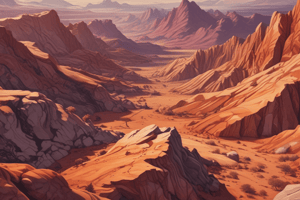Podcast
Questions and Answers
What type of soil is deposited from the suspension in running water?
What type of soil is deposited from the suspension in running water?
Alluvial soil
What type of soil contains high percentage of montmorillonite and is used as a lubricant?
What type of soil contains high percentage of montmorillonite and is used as a lubricant?
Bentonite Soil
Which soil is dark in color, contains excess of montmorillonite, and is used for growing cotton?
Which soil is dark in color, contains excess of montmorillonite, and is used for growing cotton?
Black Cotton Soil
What type of soil is a mixture of fine-grained inorganic soil and black decomposed organic matter?
What type of soil is a mixture of fine-grained inorganic soil and black decomposed organic matter?
Which highly organic soil consists of black decomposed organic matter?
Which highly organic soil consists of black decomposed organic matter?
What type of soil is black, sticky, and highly plastic?
What type of soil is black, sticky, and highly plastic?
Which soil is a mixture of clay, silt, and sand, formed due to leaching?
Which soil is a mixture of clay, silt, and sand, formed due to leaching?
What type of soil is found in hilly regions of eastern ghats and western ghats and is known for its cemented volcanic ash composition?
What type of soil is found in hilly regions of eastern ghats and western ghats and is known for its cemented volcanic ash composition?
Flashcards are hidden until you start studying
Study Notes
Soil Types and Characteristics
- Alluvial soil: formed from chemically weathered volcanic ash, found near river banks
- Bentonite soil: contains high percentage of montmorillonite, used as lubricant
- Lacustrine soil: deposited from suspension in still lake water, a type of transported soil
- Residual soil: formed from basalt, dark in color
Soils and Their Characteristics
- Black Cotton soil: contains excess montmorillonite, dark in color, used for growing cotton, also known as Aeoline soil
- Loess soil: uniformly graded wind-blown silt, slightly cemented by calcium compounds and montmorillonite, found in marshy/swampy areas
- Muck soil: mixture of fine-grained inorganic soil and black decomposed organic matter, found in marshy/swampy areas after overflow of water
Glacial and Other Soils
- Glacial soil: highly organic soil, consists of black decomposed organic matter, a type of transported soil
- Peat soil: consists of black decomposed organic matter, highly organic soil
- Cumulose soil: peat + muck, also referred to as "Talus", a type of transported soil
- Colluvial soil: a type of transported soil, also referred to as "Talus"
Red and Marl Soils
- Red soil: formed due to decomposition of plant and animal bones, found in areas of less rainfall in eastern and western ghats
- Marl soil: finely grained calcium carbonate soil of marine origin, found in areas of less rainfall in eastern and western ghats
Loam and Laterite Soils
- Loam soil: mixture of clay, silt, and sand, formed due to leaching (washing out of siliceous compounds and deposition of ferric oxide and aluminium oxide)
- Laterite soil: formed due to leaching, found in hilly regions of eastern and western ghats
Gumbo and Tuff Soils
- Gumbo soil: black, sticky, and highly plastic soil
- Tuff soil: fine-grained slightly cemented volcanic ash, transported by wind or water
Studying That Suits You
Use AI to generate personalized quizzes and flashcards to suit your learning preferences.




